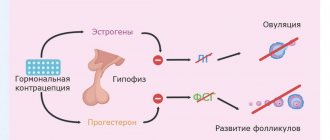After your first period, your body establishes a cycle of ovulation and menstruation, which lasts about 28 days. But how does this all happen?
The menstrual cycle is a natural part of every woman's life. In order to understand how it happens and how long periods last, you need to study female anatomy.
Hymen
A soft, elastic layer of skin with an opening that surrounds the entrance to the vagina from the outside. Many girls' hymens break down long before they lose their virginity.
Vagina
Elastic muscular tube. At first, the vagina is narrow, but it expands in depth.
The vagina connects the uterus to the external genitalia. The entrance to the vagina is located between the urethra and the anus.
Cervix
Entrance to the uterus and vagina
Uterus.
It has compacted muscle walls and a small cavity, the walls of which are covered with mucous membrane.
Fallopian tubes
Through them, the fertilized egg enters the uterus with the help of tiny villi.
Ovaries
Eggs mature inside them.
Endometrium
The fertilized egg is located in this glandular tissue. If the egg is not fertilized, the glandular tissue leaves the body during menstruation.
Pelvic floor muscles
Keep the genitals in their place.
Clitoris
Located in the front of the urethra, between the labia minora, it is a cluster of nerve endings that cause sexual arousal.
Labia
The opening to the vagina is surrounded by the outer (major) and inner (minor) labia.
Periods (phases) of the menstrual cycle
Every menstrual cycle, a woman's body prepares for pregnancy. The menstrual cycle can be divided into several periods (phases).
Most often, the duration of the menstrual cycle is 28 calendar days. However, for each woman it is strictly individual; it’s normal if it falls within the range of 21 to 35 days. The main factor is its constancy throughout the reproductive period; permissible deviations are no more than 3 days. An important indicator is also the amount of discharge and the woman’s well-being during this period. Any changes in the normal rhythm or signs of malaise are a reason to consult a doctor, as they may well become the first signs of a disease.
The structure of the female genital organs
A woman's external genitalia include the labia majora, labia minora and the clitoris. The labia minora border the opening of the urethra (urethra) and the vestibule of the vagina. The point of their connection is the clitoris, covered with a thin mucous membrane, the so-called mucosa. The clitoris, due to its sensitivity, plays a significant role in sexual arousal. Inside, the vagina is connected to the cervix, which is its lower part. Then the uterus expands, and it is into it that the egg enters, and the embryo and fetus develop during pregnancy.
Ovulation
When your body produces enough sex hormones, one egg matures in one of your ovaries approximately every 4 weeks. A mature egg leaves the ovary and moves to the fallopian tubes. This process is called "ovulation". During this period, you may experience more abundant and clear discharge.
Fallopian tubes
Over the next 4 days, the egg moves through the fallopian tubes to the uterus
Location of the egg
At the same time, the endometrium (the lining of the uterus) thickens to create the most comfortable place for the subsequent placement of the egg, strengthened by blood vessels and supplied with nutrients.
Menstruation
If the egg is not fertilized, it leaves the body along with menstrual flow. The place prepared for the development of a fertilized egg also becomes unnecessary. Approximately 2 weeks after ovulation, the upper layers of the endometrium are shed and excreted from the body in the form of menstruation. With the onset of menstrual flow, a new egg begins to mature and a new cycle begins.
Follicular period of the cycle
This is followed by the follicular period, characterized by the cessation of discharge. At this time, increased synthesis of pituitary and hypothalamic hormones begins, affecting the ovaries. The main one is follicle-stimulating hormone (FSH), which causes intensive growth and development of several follicles. The ovaries, in turn, produce the sex hormone estrogen; its significance is to stimulate endometrial renewal and prepare the uterus to receive an egg. This stage lasts about two weeks and ends due to the release of hormones into the blood that suppress FSH activity.
Bleeding intensity
The bleeding that we call "discharge" or "period" is not always the same in intensity. Various life circumstances - the birth of a child, diet, stress, different methods of contraception - can affect how long your period lasts and the intensity of discharge during this period. It is different for different women, and also sometimes differs for the same woman in different menstrual cycles - all this is not a deviation from the norm. Therefore, tampons are available in many formats and with varying degrees of absorbency. By choosing the right product, you will be protected and able to feel comfortable every day of the month - so that nothing gets in the way of enjoying life without compromise, even during menstruation. Use our tampon selector to find out which tampon is right for you. Talk to your doctor or gynecologist if you have questions about your period or problems with your menstrual cycle.
Ovulation
The phase of ovulation begins, that is, the release of a mature egg from the follicle. As a rule, this is the largest of them. This is facilitated by a sharp increase in the level of luteinizing hormone (LH). The egg enters the lumen of the fallopian tube and begins its movement towards the uterus, at the same time awaiting fertilization. Its lifespan does not exceed two days, so to increase the likelihood of conception it is necessary that the sperm is already in the fallopian tube. At this time, the process of preparing the epithelial layer continues in the uterus.
Rules of behavior and hygiene during menstruation
Relaxation can help relieve pain during menstruation. Activities that promote blood circulation will help reduce cramping. Take a walk, ride a bike, put a heating pad on your stomach, or take a warm bath.
Before your period, it is important to do things that bring you pleasure: communicate with friends, buy yourself your favorite treat, sleep more, in a word, do things that will help neutralize the effects of the negative symptoms of PMS (premenstrual syndrome).
Water will help cope with bloating and reduce fluid retention in the body before menstruation. It's hard to believe, but consuming it can actually reduce PMS symptoms. Eat vegetables and fruits with a high water content, drink warm herbal tea and juices. Add foods high in magnesium and vitamin E (dried apricots, bananas, avocados, etc.) to your diet. It is recommended to reduce the consumption of black and green tea, coffee, salt and sugar.
During menstruation, you must follow the rules of personal hygiene: use pads or tampons to absorb discharge, shower daily, wash your face 2-3 times a day. Experts recommend stopping sexual activity during menstruation.
Luteinizing period of the cycle
The final period of the menstrual cycle is the luteinizing period. Its duration, as a rule, does not exceed 16 days. At this time, in place of the follicle that the egg left, a special temporary gland is formed - the corpus luteum. It produces progesterone, which is designed to increase the sensitivity of the endometrium, in order to facilitate the implantation of a fertilized egg into the wall of the uterus. If implantation does not occur, the corpus luteum regresses and progesterone levels drop sharply. This causes destruction and subsequent rejection of the epithelial layer, the cycle closes.
Days of menstruation
Let's take a closer look at what changes in the female body occur during menstruation.
Day 1. At the beginning of the menstrual cycle, it begins with the rejection of the “old” endometrium - a special layer of the uterine mucosa - and the bleeding itself. This process, necessary for the female body, often becomes one of the most uncomfortable periods of everyday life. Unpleasant sensations during menstruation are normal and are caused by contractions of the uterus.
Day 2. On the second day of the monthly cycle, pain and heaviness in the abdomen may persist. Meanwhile, the body begins to form a new egg. During menstruation, the functioning of the sebaceous glands may change due to hormonal changes, so it is important to pay special attention to personal hygiene.
Day 3. After the “old” endometrium is rejected, a wound surface forms on the walls of the uterus. At this stage of the menstrual cycle, the risk of infection is especially high, so gynecologists recommend abstaining from sexual activity while your period lasts.
Day 4. By the 4th day of the menstrual cycle, the woman’s well-being improves, but during menstruation it is still worth limiting physical activity and trying not to overwork. Following these recommendations reduces the amount of blood loss during menstruation.
Day 5. As a rule, menstruation lasts 5 days, but there may be individual differences. During this time, the healing process in the uterus is completed. Metabolism accelerates in the renewed body, and the woman feels much better and more energetic compared to the beginning of the menstrual period.
Phases of the menstrual cycle
| First phase (follicular, or egg development) Day 1-5. Menstruation: Menstruation usually lasts from 2 to 7 days, with an average of 5 days. During this phase, the inner lining of the uterus (endometrium) is shed and menstruation begins. Contractions of the uterus at this moment may be accompanied by pain in the lower abdomen. Some women have short periods (for example, 2 days), while others can last as long as 7 days. Bleeding may be profuse and spotting. In the first half of the menstrual cycle, a follicle grows in the ovary, where an egg develops and matures, which then leaves the ovary (ovulation). This phase lasts about 7-21 days, which depends on many factors. | Ovulation Day 14. Release of the egg. Ovulation usually occurs from the 7th to the 21st day of the cycle, often in the middle of the menstrual cycle (approximately on the 14th day in a 28-day cycle). After leaving the ovary, the mature egg moves to the uterus through the fallopian tubes. | Second phase (formation of the corpus luteum) Day 15-28. Thickening of the inner lining of the uterus. After ovulation, the ruptured follicle transforms into the corpus luteum, which produces the hormone progesterone. |
You can make an appointment with a doctor by phone in Moscow: +7 (495) 601–15–15 or here. you can see the doctor here.
| m. Krasnopresnenskaya |
| Konyushkovskaya st., 26 |
Lecture “How to avoid becoming a victim of a gynecologist”
Introduction
It just so happens that the reproductive function is activated in the girl’s body at the moment when she does not care about this function at all.
Having just put the dolls aside, the girl is faced with a whole series of little-understood processes occurring in her body, which immediately begin to be heatedly discussed among her peers, with consultations from those who are older. And mothers in this situation do not always rise to the occasion, since they themselves are poorly versed in this topic. So, let’s figure out once and for all what happens to you every month, dear women, what is considered normal, what should alert you.
Most women, when asked about the duration of their menstrual cycle, answer with a similar phrase “about once a month, a couple of days earlier than in the previous month”
- this intricate phrase denotes the duration of the cycle of 28 days. This cycle length occurs in most healthy women, but does this mean that a shorter or longer cycle is a manifestation of pathology? No!
It is recognized that a normal menstrual cycle can last from 21 to 35 days
, that is, plus or minus a week from the average of 28 days. The duration of menstruation itself can normally range from 2 to 6 days, and the volume of blood lost should be no more than 80 ml. A longer cycle occurs among residents of the northern regions, a shorter cycle among those living in the southern regions, but this is not an absolute pattern.
Regularity is important in the menstrual cycle.
That is, if a woman’s cycle is always 35-36 days, then this can be absolutely normal for her, but if it is either 26, then 35, then 21, this is not the norm.
Thus, a pathology can be considered irregularity
(when menstruation comes at an unequal period of time),
a long cycle
(more than 36 days) or
a short cycle
(less than 21 days). In general, the menstrual cycle can vary greatly depending on the condition of the woman and the situation in which she finds herself.
However, the lability of the menstrual cycle varies among different women depending on external and internal factors. For some, a little stress can already lead to a delay in menstruation, while for others, severe depression is not a reason for menstrual irregularities. The menstrual cycle of one woman can adapt to the menstrual cycle of another if they live together for a long time. This is often seen on women's sports teams or when living together in a dorm. It is not entirely clear what explains this fact. All we can say is that the menstrual cycle
Although it is a clear mechanism,
it can change significantly in a normal healthy woman
, and these changes are a reflection of the body’s reaction to external and internal factors.
The menstrual cycle is not always stable
The most irregular period is the first two years after the start of menstruation and three years before its end (menopause). Violations during these periods are due to completely physiological reasons, which we will discuss below.
Where do these numbers come from and why might they change?
The menstrual cycle is divided into three phases:
menstruation, the first phase (follicular) and the second phase (luteal). Menstruation lasts on average 4 days. During this phase, the lining of the uterus (endometrium) is shed due to failure to become pregnant.
First phase
lasts from the end of menstruation until ovulation, that is, on average until the 14th day of the cycle with a 28-day cycle (the days of the cycle are counted from the moment the menstruation begins).
This phase is characterized by the following events:
several follicles begin to grow in the ovaries (from birth, the ovaries contain a lot of small vesicles (follicles) containing eggs). During their growth, these follicles secrete estrogens (female sexual hormones) into the blood, under the influence of which the mucous membrane (endometrium) grows in the uterus.
Shortly before the 14th day of the cycle, all follicles except one stop growing and regress, and one grows to an average of 20 mm and bursts under the influence of special stimuli. This process is called ovulation. An egg emerges from the ruptured follicle and enters the fallopian tube, where it awaits the sperm. The edges of the ruptured follicle gather (like a flower closing for the night) and this formation is now called the “corpus luteum.”
Immediately after ovulation, the second phase of the cycle begins.
It lasts from the moment of ovulation until the start of menstruation, that is, about 12-14 days. During this phase, the woman's body waits for the pregnancy to begin. In the ovary, the “corpus luteum” begins to flourish - the corpus luteum formed from the burst follicle sprouts vessels and begins to secrete another female sexual hormone (progesterone) into the blood, which prepares the uterine mucosa for the attachment of a fertilized egg and the beginning of pregnancy. If pregnancy does not occur, then a signal is sent to the corpus luteum and it curtails its work.
When the corpus luteum stops secreting progesterone, a signal is sent to the uterus, and it begins to reject the no longer needed endometrium. Menstruation begins.
With different cycle lengths, the duration of the phases is reduced - this means that one woman needs 10 days for the follicle to mature, while another needs 15-16.
Having understood what the menstrual cycle consists of, it is easy to understand what determines its duration normally and in the presence of pathology.
Why is everything often unstable at the very beginning and then, after childbirth, it gets better?
A woman's reproductive system matures gradually and, being a complex mechanism, requires a period of adjustment.
The fact that a girl has her first menstruation
does not mean that her system is mature and ready to work fully
(although for some, the menstrual cycle begins to work correctly from the very beginning).
The functioning of the female reproductive system can best be compared to an orchestra, the coordinated play of all the instruments of which creates the unique sound of a piece of music - in our case, the regular menstrual cycle.
Just as instruments in an orchestra require a period of tuning, all components of the reproductive system need to agree with each other to understand and work together harmoniously. Such a rehearsal usually takes about 6 months - for some it is longer, for others it is shorter, and for others it may take longer.
Why do there be delays or do my periods start earlier?
Everything is very simple - if during the first phase of the cycle it is not possible to grow a full-fledged follicle, which could burst in the middle of the cycle (ovulation), then the second phase of the cycle, accordingly, does not begin (no ovulation - there is nothing to form the corpus luteum from). The first phase lasts a long time, until the uterine mucosa (endometrium), which has grown under the influence of estrogen, begins to be rejected on its own (like a pyramid of cubes collapses when it is stood too high). The cycle in this situation can last up to several months.
In this case, in the next cycle, ovulation may occur and the cycle will have a normal length. When such alternation occurs, they speak of an irregular menstrual cycle.
Another reason for delayed menstruation may be the existence of the corpus luteum for too long.
As I noted above, it lives for about 10 days and then begins to curtail its work, since pregnancy has not occurred. But sometimes it happens that despite the fact that pregnancy has not occurred, the corpus luteum continues its work and menstruation does not occur, and occurs only when the corpus luteum finally decides to leave.
Earlier onset of menstruation
This is usually due to the fact that the notorious corpus luteum, on the contrary, stops its work too early. This leads to an earlier onset of menstruation.
Remember how the orchestra sounds when it tunes its instruments - the same cacophony from the menstrual cycle is often observed at the beginning. The components of the reproductive system negotiate so that they can grow a follicle in 14 days, start the ovulation process, and maintain the corpus luteum for at least 10 days. At the beginning, she does not succeed in all stages of this work and this is manifested by an irregular menstrual cycle.
But this adjustment can be seriously interfered with by the person himself. Nothing has such a negative effect on the development of the reproductive system as stress.
(intense study, exams, unhappy love),
intense sports training, extreme weight loss, frequent illnesses, smoking, alcohol and drugs.
Against the backdrop of all of the above, quite often
menstruation disappears
and then you have to wait a long time for them. And the reason is very simple, I would say there is simple biological expediency in this - in extreme living conditions and when, for health reasons, a woman cannot bear healthy offspring - the reproductive function is switched off until better times. It’s not for nothing that during the war, most women stopped menstruating; this phenomenon was even given a special term “wartime amenorrhea.”
What to do about it?
Let me make a reservation right away that I am not taking into account various diseases, I am talking about some common problems with adjusting the menstrual cycle. Such cycle disorders are solved by taking hormonal contraception. Here we need to return again to the comparison with the orchestra. If the orchestra starts to go out of tune, you must stop playing completely, give the musicians a rest and start again. Hormonal contraception does just that. She turns off the reproductive system and “rests” the entire time she takes contraception. Then, after its cancellation, the system begins to work again and, as a rule, the cycle failures disappear.
Why does the cycle quite often become stable after childbirth, and sexuality flourishes?
The orchestra can rehearse as much as it wants, but it is finally played only when it performs its first concert from beginning to end. Pregnancy is the only purpose for which the reproductive system is designed in the body.
Only after the first full pregnancy, which ends in childbirth and the period of breastfeeding, the reproductive system matures completely, since during this period all the functions provided by nature are realized. After pregnancy, a woman finally matures and all the not fully “unpacked” properties of the body finally begin to work in full force.
The reproductive system must be used for its intended purpose - this is important; menstruation is not a function of the reproductive system, but a monthly reminder that it exists at all and is still working.
Let's step beyond 30...
Time passes, the reproductive system, which on average is allotted to exist in working order for 38 years (from 13 to 51), instead of performing its function is limited only to regular menstruation.
For reference:
on average, a woman experiences about 400 menstruation during her life (with 2 births) and loses about 32 liters of blood, while during reproductive behavior (pregnancy, childbirth, 3 years of breastfeeding, and only then 1-2 menstruation and pregnancy again ) there are about 40 menstruation periods.
In addition, as a woman ages, her history of various gynecological and general diseases
, and all this begins to affect the state of the reproductive system and, therefore, is reflected in menstrual irregularities.
Inflammation, abortion, gynecological operations, overweight or underweight, and common chronic diseases can cause problems.
Menstrual irregularities in the form of delays or earlier onset of menstruation a couple of times a year can occur even in the absence of any pathology.
As a rule, this is due to climate change or other stresses on the body (illness, hard work, personal problems, etc.). All nervous professions can lead to either delays in menstruation, their earlier onset or complete cessation.
Every woman is different, so everyone's cycle will change differently depending on the type of stress response and the phase of the cycle in which it occurs. For the majority of women, nerve work does not affect their menstrual cycle at all. Cycle disorders
, especially if it was stable before, often make a woman think that something is wrong with her.
Not in all cases you need to panic.
If you can clearly remember any negative events in the recent past that greatly shocked you, then most likely this is a one-time cycle disruption and there is nothing wrong with it. If there is no menstruation for a very long time (and the pregnancy test is negative), then you need to consult a doctor. If menstruation came earlier and does not end, this is also a reason to rush to see a gynecologist.
Sometimes cycle disorders can manifest as very frequent menstruation
(several times a month).
And there is no need to delay it - see a doctor immediately. But if the regularity of the cycle disappears completely
, this is also a reason to consult a doctor.
Regularity
– the main indicator of the normal functioning of the reproductive system. Sometimes it happens that a cycle had one duration and suddenly becomes shorter while maintaining its regularity. As a rule, this is due to the fact that the second phase of the cycle becomes shorter, as the corpus luteum begins to work less. Such changes are more often observed closer to 40 years. This is not a reason to panic, but simply a reflection that your reproductive system will change as you age, just like you.
Early menopause
This is one of the very common fears of women. In fact, this fear is exaggerated, since early menopause is quite rare
. It is mainly caused by rare congenital diseases, rare systemic diseases, consequences of treatment (chemotherapy, radiation therapy for cancer) and other rare conditions. There are situations when, as a result of surgery, a woman’s ovary or part of it is removed. Then menopause may occur earlier due to the fact that there is little tissue left in the ovaries that could support the normal functioning of the reproductive system.
Early menopause
As a rule, it is manifested by the cessation of menstruation and the appearance of symptoms of insufficiency of female sex hormones (hot flashes, irritability, tearfulness, insomnia, etc.). There is no prevention of this disease.
Painful periods and PMS
For some reason, it is generally accepted that feeling unwell during menstruation is normal.
The presence of pain, nausea, and migraines during menstruation
is not normal.
This condition of painful menstruation is called
dysmenorrhea
and requires treatment. Even if these phenomena are expressed insignificantly, they can and should be corrected.
Dysmenorrhea
It can be either
primary
(most often at a young age), when it is most likely due to simply the immaturity of the reproductive system, and
secondary
– when it is a reflection of a number of serious
gynecological diseases
.
The same applies to premenstrual syndrome. In general, the widespread popularization of this syndrome allows women to attribute their sometimes not entirely adequate actions and behavior to manifestations of this syndrome. However, PMS is not a woman’s personality trait.
, which everyone has to put up with.
PMS is a disease
that has incompletely understood causes, a whole list of symptoms and specific treatment measures. Manifestations of PMS can and should be corrected. It is wrong to take monthly illness for granted in modern conditions. If you have such problems, consult a doctor.
How it all ends
Decline of the reproductive system
usually occurs in the same way as its formation. Menstruation becomes irregular and there is a tendency to be delayed. This is due to the same reasons as in the beginning.
The ovaries respond less well to stimuli from the brain. It is not possible to grow follicles that could reach ovulation - accordingly, the cycle is delayed. If ovulation occurs periodically, the resulting corpus luteum does not work well. Because of this, periods either start earlier or, on the contrary, are delayed for a long time. Eventually your periods will stop, and if you haven't had them for more than 6 months, you should see a doctor. Based on hormonal tests and ultrasound, the onset of menopause can be assumed.
Sometimes there are cases when menstruation stops for a long period of time
, and according to tests and ultrasound, the onset of menopause is expected. This can be especially frightening for young women. However, this may only be a temporary period, and menstruation may resume on its own, for example after proper rest.
Thus, the myth that 28 days is the norm and everything that differs from this figure is pathology has been debunked. The main thing in the menstrual cycle is its regularity, and the duration of the cycle can fluctuate over a wide range.
And yet, there is a simple rule: if you regularly undergo preventive examinations with a gynecologist (at least once a year), if any violations appear, do not put off an “unpleasant” trip to the gynecologist - then you will almost never have serious gynecological problems.
Video version:
Popular questions
Tell me, the condom broke (day 19 of the cycle (cycle 27-28 days), which is better to take gynepristone or postinor?
Hello! When choosing an emergency contraceptive drug, contraindications specifically for you are taken into account.
There may be a normal cycle of 28 days, the duration of menstruation is 2 days. during pregnancy?
During pregnancy, there cannot be menstruation, since conception and implantation of the fertilized egg into the endometrium have occurred, which triggers a mechanism that prevents its rejection.
Cycle 25 days. The unprotected period was on the night of February 12-13, the last menstrual period was 1.02. What is the likelihood of pregnancy and when can I take a test?
Hello! With unprotected sexual intercourse, the likelihood of pregnancy is very high. The test will be reliable if there is a delay of 3 days.
I am 48 years old; menstruation began at the age of 11; it went on for a week, now it began to go for 3 days, but not so heavy. And the last ones started on February 28 until March 4, they went fine, from March 5 to March 12 it was blurry, and on March 13 they started again. What could it be?
Hello!
You are describing a menstrual irregularity. This requires an immediate visit to the doctor and an examination, including a smear for flora and oncocytology, an ultrasound of the pelvic organs, which will accurately identify the cause of bleeding. For an accurate diagnosis, contact a specialist
What can affect the cycle shift
The considered phases of menstruation are a very clear and fragile mechanism that can be disrupted due to many factors. The main supporters of these phases are hormones, which mutually replace each other to achieve a single goal - conception and birth of a child. A disruption in the production of any of the hormones will lead to a break in the sequential chain and affect the final outcome and duration of the cycle.
Possible reasons for the shift in the phases of the menstrual cycle:
- Psychological disorders and stress;
- Impact of ecology and other environmental factors;
- Age (puberty or menopause);
- Diseases of the reproductive system and pelvic organs;
- Surgeries or injuries on the reproductive organs;
- Lifestyle (physical activity and bad habits);
- Taking hormonal contraceptives or other strong medications.
Each female body is individual, and in its own way susceptible to various factors that can disrupt the usual cycle. For convenience, it is recommended to keep a menstrual calendar or diary, marking the beginning and end of menstruation, well-being, and accompanying symptoms.
The phases of the monthly cycles are a consistent and constant phenomenon that every woman faces. The order of these phases is firmly established, but their duration can vary depending on the characteristics of the body and external factors. Knowing all three phases of her menstrual cycle, a woman can easily calculate the favorable period for conception or when to expect premenstrual syndrome.
At what age do girls start menstruating?
In girls of the European race, menarche most often occurs at 12-13 years of age, less often menstruation occurs at 10-11 years and 13-14 years1,2,3. Over the past 100-150 years, scientists have observed a marked decline in the age at which puberty begins2. Therefore, menstruation in a 9-10 year old girl no longer frightens doctors and parents2,3. Rather, the absence of menstruation at the age of 14.5 years is alarming2,3.
All the figures we have given are average values. Things may be a little different for you. The appearance of menarche is influenced by many factors:
- Genetics. If your mother started menstruating later than her peers, then there is a chance that you will have to wait a little too2.
- Race. Early menarche is typical for representatives of the Negroid race, Latin Americans, and for Caucasians and Asians, menstruation begins later2.
- Nutrition. Good nutrition promotes the formation of menstruation, but diet delays puberty 2.
- Body mass. Slightly plump girls start their periods earlier2. But if body weight is significantly higher than normal, there is a delay in the appearance of menstruation2.
Up to contents
Tips on the problem: what can you do yourself?
If an irregular cycle is caused by lifestyle, women can try to treat the hormonal disorder on their own. Tips will help:
- Relax: If the cause of discomfort is stress or mental imbalance, you should immediately try to relax. For example, with the help of yoga or autogenic training.
- Change your diet: A healthy and balanced diet with plenty of fibre, lean meats and dairy products, and fruits and vegetables supports all physical processes - and therefore cycle regularity.
- Exercise: No one should exercise every day. But light exercise, such as cycling or swimming for 30 minutes three times a week, will not only improve your fitness, but also keep your hormones balanced.
If irregularities in the menstrual cycle are associated with other reasons, you should definitely contact a good gynecologist.
ONLINE REGISTRATION at the DIANA clinic
You can make an appointment by calling the toll-free phone number 8-800-707-15-60 or filling out the contact form. In this case, we will contact you ourselves.
Unnatural causes of irregular periods
Many diseases, medications, and even life situations can cause a disruption in the cycle. Common reasons are 3:
- Disturbances in the production of certain hormones. The most noticeable pathology is hyperprolactinemia, in which the hormone prolactin is produced. This hormone provokes breast growth, milk production and inhibition of the menstrual cycle.
- Various diseases of the ovaries (polyxtosis).
- Neoplasms in the female reproductive system - cystomas and fibroids.
- Inflammatory processes and genital infections.
- Endometriosis is a hormonal imbalance that disrupts the cyclicity of menstruation.
- Taking medications, predominantly of the hormonal type.
An interesting experiment was conducted within the walls of the Institute of Cytology and Genetics. Researchers have tried to establish a relationship between female scent and attractiveness. Completely anonymous, men gave positive or negative points for smell. Thus, based on statistics, an attractive type of female scent was determined. The experiment found that girls with irregular menstrual cycles received significantly lower grades than girls with regular cycles. This can be associated with the fact that the male brain reflexively gives the body a command to interrupt contact with a woman who may have problems with reproductive functions4.








